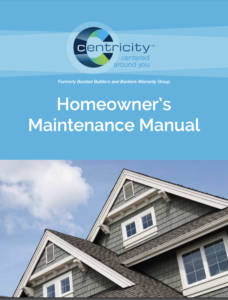Check out our tips, videos, and resources for all of your home maintenance needs.
Home Maintenance
Centricity Homeowner Maintenance Manual
Please call a licensed and insured professional to perform any work that may beyond your capabilities.
Click the image below to download the Centricity Homeowner Maintenance Manual.
Shutting Off Your Back Flow Preventer
What to do in the event of freezing temperature? What do you need to protect?
Residents have been experiencing bursting back flow preventers on the irrigation system. In the event of a leak, contact a plumber to have a new back flow preventer installed. If you are unable to shut the water down, contact Resident Services to have Bay Laurel shut the water down.
To protect the back flow preventer, covers are available at Resident Services. These are used to insulate the backflow in the event of a freeze. The cost is $80.00.
Additionally, you will want to shut the system down and drain the back flow.
To do this, shut the valve off on the supply side of the back flow, this would be the bottom of the back flow.
How To Shut Off The Back Flow Preventer:
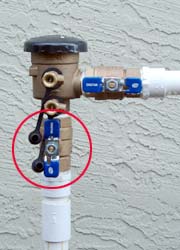
It will look like the picture on the right.
Once this is done, turn on an irrigation zone and run the zone until no more water comes out of the heads. Turn the zone back off.
Now that you have drained the system down, you can open the drain cock just above the valve that was shut down to drain the remaining water out of the back flow. Leave open until freezing temperatures have subsided.
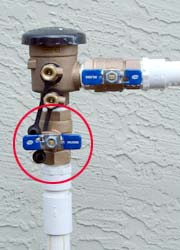
Step 2. Using a flat head screwdriver turn this valve a quarter turn counter-clockwise and leave open until cold weather subsides.
Insulate the back flow with a blanket or other insulating materials.
To pressurize the system once freezing temperatures have subsided, open an irrigation zone on the controller. Once the zone is on, close the drain cock above the main valve and open the main valve. Allow all of the air to be purged from the system and make sure the irrigation heads are operating appropriately.
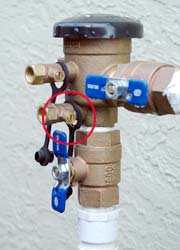
Step 3: Once the system if free of air, turn the irrigation zone back off.
If you have questions, please feel free to ask at Resident Services.
Air Conditioning
- Change filters monthly.
- Annual maintenance by a professional licensed company is recommended to keep the unit in top condition.
- The outside air conditioning unit must be kept clear of all obstructions.
- Return air ducts must be kept obstruction free at all times.
- Check to ensure that your condensate drain line is draining properly. The condensate line will drip water when the air conditioning is running if it is functioning properly.
- We recommend pouring 1 cup of vinegar into the condensate line every 3 to 4 months. This is intended to prevent the condensate line from backing up. Please refer to your owner’s manual for further maintenance instructions.
- Optimum thermostat temperature settings: For winter – between 68-72 degrees; for summer – between 76-80 degrees.
- For extended service plans, please consult your Air Conditioning contractor.
Cabinets
- Do not use water on wood cabinets.
- Use furniture polish to keep cabinets clean.
- Do not store excessive weight in the cabinets.
Electrical
- Change batteries on smoke detector every six months. General rule of thumb is to change the batteries when you change your clocks for Daylight Saving Time.
- Ground Fault Circuit Interrupters (GFCI or GFI) outlets are installed around the wet areas of your home, including bathrooms, the kitchen, the garage, and all exterior outlets. GFCI outlets are mandated by national electric code and state building code. GFCI outlets are designed to trip easily when exposed to moisture or power surges.
- When a GFCI outlet is not working, unplug appliance connected to the outlet and then hit the reset button on the outlet or the nearest outlet with the reset button.
- GFCI outlets are not designed to handle the load of a refrigerator.
- Periodically clean the filter on the range hood.
Plumbing (Toilets, Water Heater, Shower, and Tubs)
- If you plan to leave town for an extended period of time and you have an electric water heater, you may want to consider shutting off the water heater at the circuit breaker, this will save on your electric bills. For natural gas units, the temperature setting may be reduced to the lowest setting. Upon returning, readjust temperature to your desired setting.
- When returning from an extended trip, you may notice a strange smell to the water. This is normal for water that becomes stagnate in the water heater. You may drain the water heater by running hot water in the tub. The water heater can also be drained directly, but only after the power has been turned off to the unit. For natural gas units, turn the gas control to “off” before draining. The pilot light in the gas unit will need to be reignited before use. We recommend that you review your water heater manual for more information.
- Inspect caulking around the shower and tub and repair as needed.
- Modifications to plumbing should be done by a licensed plumber.
- Combustible material must be kept away from your hot water heater.
- Do not pour grease down the drain. Grease is a leading cause of drain clogs.
- During extreme cold weather, disconnect hose from hose bib to protect bib from freezing.
- If you have a backflow preventer on your irrigation system, you should cover it during extreme low temperatures.
Windows
- Most new homes inside On Top of the World use Better Built windows. You can read about cleaning and maintaining your windows at the following Web site: http://www.miwd.com/miscPages/prodCare.aspx
- Condensation on windows during the first year is normal.
Around the House
- If you have gutters, routinely check to make sure that there is no blockage or drainage problems.
- Check for downed tree limbs that may have fallen on your roof or around your home.
- Visually check ridge vents on the roof for any noticeable problems. This will help prevent roof leaks.
- Inspect the weather stripping around your doors. Weather stripping may be damaged by normal wear and tear or even by pests. Homeowners are responsible for replacing weather stripping as needed.
- Clean the dryer vent to remove lint and other debris.
- Annually apply pest control to prevent insects, especially termites from doing damage to your home.
- Please be aware when hanging pictures or other items on the dry wall, there may be plumbing, electrical, or gas lines behind the wall.
Maintenance Videos
A/C Maintenance
Bathroom & Shower Maintenance
Water Valve Shut Off
Lawn Maintenance
Fertilizer Tips
Click the links below to check out the different fertilizer tips from these online resources:
Controlling Cinch Bugs
Chinch bugs are probably the toughest pest to control in St. Augustine lawns. Chinch bugs feed on the sap of the St. Augustine grass and have piercing sucking mouthparts. Many people do not know but the chinch bug is not the actual killer, it is the saliva of the insect that kills the plant, it clogs the vascular tissue of the plant not allowing the flow of water and nutrients to the plant.
Chinch bugs are found in the thatch layer of the grass. They are about 1/8 to 1/5 of an inch long or smaller. The adults have distinct white strips that cross their back and the young or nymphs are an orange-red color with a white strip across their abdomen. Chinch bugs will over winter in shrub beds or down in the soil area and when the weather warms up they come out.
Chinch bug damage is often mistaken for drought stress until it is too late. When looking for chinch bugs do not look in the grass that is already dead, look toward the margins of the dead area in grass that is alive. Spread the grass apart and look for the insects that are black and have white strips across their back or the young. An easier way of to detect a chinch bug infestation is to take a coffee can and remove both end, soften the soil with a little bit of water so you can stick the coffee can into the earth about 2-3 inches leaving at least 4 inches of the coffee can above ground. Fill the coffee can up with water and wait, the chinch bugs will float to the top.
If a chinch bug infestation is present report this to your spray company so treatment can begin as soon as possible. Chinch bug damage that is noticed early can be treated typically with little damage to the grass; a good fertilization should revive the grass and fill the area back in with time. Keep in mind even after the chinch bugs have been treated and are dead it is quite possible that the area damaged will grow in size. This is because the area treated was already damaged and the results of the damage were not visible at the time of treatment.
Chinch bugs have developed a resistance to every major chemical class known. It is extremely important when treating these pests that the chemical classes have been rotated at each application for better control. This will aid in the resistance problems we see in the field.
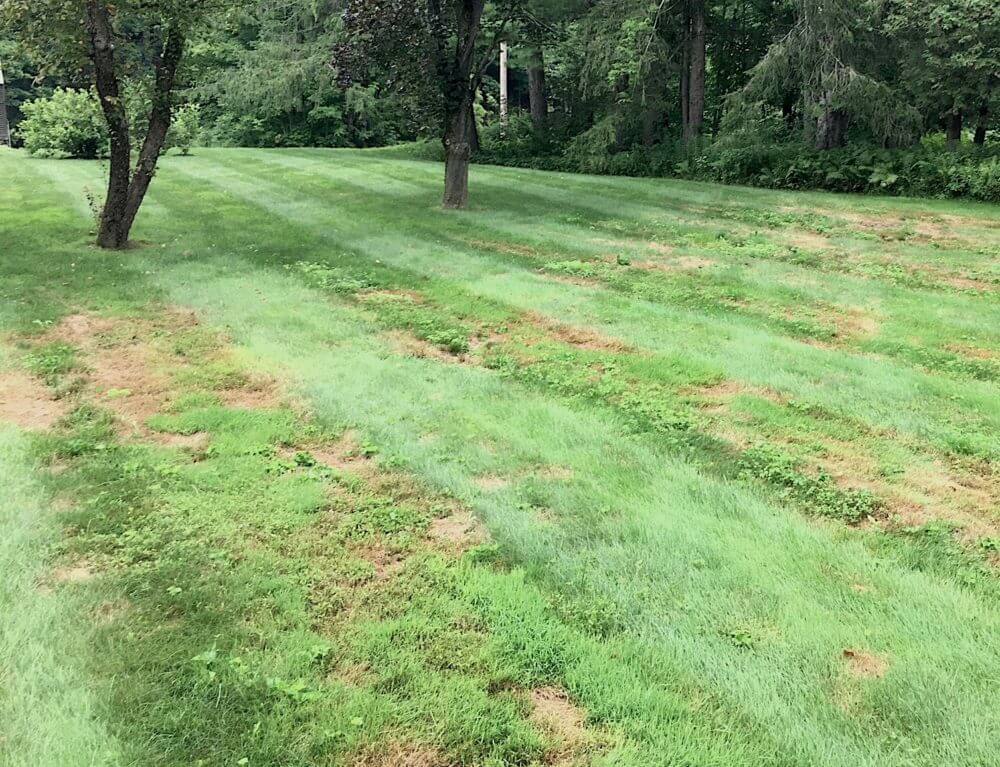
Cinch Bug Damage
Landscape Maintenance Calendar
December
Irrigation
Remember to change your controller according to Daylight Savings Time. Check your system for leaking heads, broken pipes, proper coverage and proper function to ensure the system is operational. Irrigation system should be covered in the event of freezing temperatures. Begin to slowly decrease run times for the irrigation system.
Plants/Trees
Cover plants that are susceptible to cold damage. Lantana, Society Garlic, Iris, Aztec Grass will typically survive the cold temperatures we see in Ocala from time to time. Do not worry about damage to these plants, they will be fine. You will trim back in early spring.
Turf
Watch out for unseasonably warm temperatures. Large Patch fungus will thrive when soil temperatures are between 65 and 75 degrees and moisture is present. Be sure to apply fungicides in a preventative manor when these conditions are favorable. Large Patch fungus will thrive when soil temperatures are between 65 and 75 degrees and moisture is present. Be sure to apply fungicides in a preventative manor when these conditions are favorable, if fungus is present curative applications are necessary.
January
Irrigation
Irrigation system backflow should be covered in the event of freezing temperatures. Check your system for leaking heads, broken pipes, proper coverage and proper function to ensure the system is operational in the event of unseasonably warm temperatures.
Plants/Trees
Cover plants that are susceptible to cold damage. Lantana, Society Garlic, Iris, Aztec Grass will typically survive the cold temperatures we see in Ocala from time to time. Crape Myrtles can be trimmed this early.
Turf
Watch out for unseasonably warm temperatures. Large Patch fungus will thrive when soil temperatures are between 65 and 75 degrees and moisture is present. Be sure to apply fungicides in a preventative manor when these conditions are favorable.
February
Irrigation
Irrigation system backflow should be covered in the event of freezing temperatures. Check your system for leaking heads, broken pipes, proper coverage and proper function to ensure the system is operational in the event of unseasonably warm temperatures.
Plants/Trees
Cover tropical plants and tropical trees that are susceptible to cold damage. Lantana, Society Garlic, Iris, Aztec Grass will typically survive the cold temperatures we see in Ocala from time to time. Some plants could be coming out of dormancy, be careful not to fertilize too early in the event there is a late frost. Begin trimming your Crape Myrtles.
Turf
Large Patch fungus will thrive when soil temperatures are between 65 and 75 degrees and moisture is present. Be sure to apply fungicides in a preventative manor when these conditions are favorable. Prepare yourself for a fungal problem in March.
March
Irrigation
Remember to change your controller according to Daylight Savings Time. You can now begin to water 2 times per week. The days you water are dependent upon you address. Check your system for leaking heads, broken pipes, proper coverage and proper function to ensure the system is operational. Irrigation system backflow should be covered in the event of freezing temperatures. Begin to slowly increase run times for the irrigation system.
Plants/Trees
Plants and trees should be starting to come out of their winter dormancy period. Fertilize using a complete fertilizer such as LESCO 12-2-14 or similar slow release fertilizer; be sure to follow Marion County Ordinance 08-35. You can begin trimming frost damage off of plants.
Turf
Turf should be fertilized with a complete fertilizer such as LESCO 12-2-14 or similar slow release fertilizer; be sure to follow Marion County Ordinance 08-35. If fungus is present, do not fertilize until treatment has occurred. Large Patch fungus will thrive when soil temperatures are between 65 and 75 degrees and moisture is present. Be sure to apply fungicides in a preventative manor when these conditions are favorable, if fungus is present curative applications are necessary. Preventative applications for hunting billbug are applied this time of year for Zoysia turf. Chinch bugs may become active on hotter days in St. Augustine turf. Chinch bugs have become resistant to every major chemical class. When treating chinch bugs, be sure to alternate your pesticide chemical class and/or mode of action to reduce pesticide resistance.
April
Irrigation
Irrigation operation is critical to the health of your grass. Check your system for leaking heads, broken pipes, proper coverage and proper function to ensure the system is operational. Irrigation system should be at roughly 75%-90% of the regularly scheduled run times. If unseasonably hot weather is expected run irrigation at 100% of the scheduled run time.
Plants/Trees
Insects are becoming active now; check plants for aphids, scale and other insects. Applications of minor nutrients are permissible during this time.
Turf
Chinch bugs are becoming more active now in St. Augustine turf, be sure to check irregular patches for chinch bug activity. Chinch bugs have become resistant to every major chemical class. When treating chinch bugs, be sure to alternate your pesticide chemical class and/or mode of action to reduce pesticide resistance. Tropical Sod web worms could be present, check grass layer for small worms during the day time. Masked Chafer and Sugarcane grub control is typically applied this time of year. Applications of minor nutrients are permissible during this time.
May
Irrigation
Irrigation operation is critical to the health of your grass and plants. Check your system monthly for leaking heads, broken pipes, proper coverage and proper function to ensure the system is operational. The irrigation system should be operating a 100% of the regularly scheduled run time this time of the year.
Plants/Trees
Take All Root Rot is active this time of year. It is typically triggered by high rainfall and stressed turf grass, so observe your lawn during the summer and early fall months when Florida receives the majority of its rainfall. Prolonged periods of rainfall are most conducive to this disease. Any stress placed on the turf grass will encourage or worsen the disease. Continue to monitor plants for insects. Applications of minor nutrients are permissible during this time.
Turf
Do not fertilize fungus areas. Chinch bugs are active. Chinch bugs have become resistant to every major chemical class. When treating chinch bugs, be sure to alternate your pesticide chemical class and/or mode of action to reduce pesticide resistance. Masked Chafer and Sugarcane grub control is typically applied this time of year. Applications of minor nutrients are permissible during this time.
June
Irrigation
Irrigation operation is critical to the health of your grass and plants. Check your system monthly for leaking heads, broken pipes, proper coverage and proper function to ensure the system is operational. The irrigation system should be operating a 100% of the regularly scheduled run time this time of the year.
Plants/Trees
Continue to monitor plants for insects. Fertilize using a complete fertilizer such as LESCO 12-2-14 or similar slow release fertilizer; be sure to follow Marion County Ordinance 08-35.
Turf
Fertilize using a complete fertilizer such as LESCO 12-2-14 or similar slow release fertilizer; be sure to follow Marion County Ordinance 08-35. Chinch bugs are active. Chinch bugs have become resistant to every major chemical class. When treating chinch bugs, be sure to alternate your pesticide chemical class and/or mode of action to reduce pesticide resistance. Masked Chafer and Sugarcane grub control is typically applied this time of year. Mole Cricket treatment is applied during this time of year.
July
Irrigation
Irrigation operation is critical to the health of your grass and plants. Check your system monthly for leaking heads, broken pipes, proper coverage and proper function to ensure the system is operational. The irrigation system should be operating a 100% of the regularly scheduled run time this time of the year.
Plants/Trees
Continue to monitor plants for insects. Applications of minor nutrients are permissible during this time. Applications of minor nutrients are permissible during this time.
Turf
Chinch bugs are active. Chinch bugs have become resistant to every major chemical class. When treating chinch bugs, be sure to alternate your pesticide chemical class and/or mode of action to reduce pesticide resistance. Grub control is typically applied this time of year. Applications of minor nutrients are permissible during this time. Applications of minor nutrients are permissible during this time.
August
Irrigation
Irrigation operation is critical to the health of your grass and plants. Check your system monthly for leaking heads, broken pipes, proper coverage and proper function to ensure the system is operational. The irrigation system should be operating a 100% of the regularly scheduled run time this time of the year.
Plants/Trees
Continue to monitor plants for insects. Applications of minor nutrients are permissible during this time.
Turf
Be sure to apply fungicides in a preventative manor if conditions are favorable. Other fungi are present in hotter daytime temperatures with cooler evening temperatures. If fungus is present curative applications are necessary. Chinch bugs are active. Chinch bugs have become resistant to every major chemical class. When treating chinch bugs, be sure to alternate your pesticide chemical class and/or mode of action to reduce pesticide resistance. Masked Chafer grub control is typically applied this time of year. Applications of minor nutrients are permissible during this time.
September
Irrigation
Irrigation operation is critical to the health of your grass and plants. Check your system monthly for leaking heads, broken pipes, proper coverage and proper function to ensure the system is operational. The irrigation system should be operating a 100% of the regularly scheduled run time this time of the year.
Plants/Trees
Continue to monitor plants for insects. Fertilize using a complete fertilizer such as LESCO 9-2-24 or similar slow release fertilizer; be sure to follow Marion County Ordinance 08-35.
Turf
Large Patch fungus will thrive when soil temperatures are between 65 and 75 degrees and moisture is present. Be sure to apply fungicides in a preventative manor when these conditions are favorable, if fungus is present curative applications are necessary. Chinch bugs are active. Chinch bugs have become resistant to every major chemical class. When treating chinch bugs, be sure to alternate your pesticide chemical class and/or mode of action to reduce pesticide resistance. Masked Chafer grub control is typically applied this time of year. Fertilize using a complete fertilizer such as LESCO 9-2-24 or similar slow release fertilizer; be sure to follow Marion County Ordinance 08-35.
October
Irrigation
Check your system for leaking heads, broken pipes, proper coverage and proper function to ensure the system is operational. Begin to slowly decrease run times for the irrigation system, to do this, use the seasonal adjust feature on your controller or change each run time. Do this is 5 minute increments.
Plants/Trees
Cover plants that are susceptible to cold damage. Lantana, Society Garlic, Iris, Aztec Grass will typically survive the cold temperatures we see in Ocala from time to time. Do not worry about damage to these plants, they will be fine. You will trim back in early spring. Applications of minor nutrients are permissible during this time.
Turf
Watch out for unseasonably warm temperatures. Large Patch fungus will thrive when soil temperatures are between 65 and 75 degrees and moisture is present. Be sure to apply fungicides in a preventative manor when these conditions are favorable. Large Patch fungus will thrive when soil temperatures are between 65 and 75 degrees and moisture is present. Be sure to apply fungicides in a preventative manor when these conditions are favorable, if fungus is present curative applications are necessary. Applications of minor nutrients are permissible during this time. Chinch bugs have become resistant to every major chemical class. When treating chinch bugs, be sure to alternate your pesticide chemical class and/or mode of action to reduce pesticide resistance.
November
Irrigation
Remember to change your controller according to Daylight Savings Time. You must now go back to once per week watering. Your proper watering day is dependent upon your address. Check your system for leaking heads, broken pipes, proper coverage and proper function to ensure the system is operational. Irrigation system backflow should be covered in the event of freezing temperatures. Begin to slowly decrease run times for the irrigation system
Plants/Trees
Cover plants that are susceptible to cold damage. Lantana, Society Garlic, Iris, Aztec Grass will typically survive the cold temperatures we see in Ocala from time to time. Do not worry about damage to these plants, they will be fine. You will trim back in early spring. Applications of minor nutrients are permissible during this time.
Turf
Watch out for unseasonably warm temperatures. Large Patch fungus will thrive when soil temperatures are between 65 and 75 degrees and moisture is present. Large Patch fungus will thrive when soil temperatures are between 65 and 75 degrees and moisture is present. Be sure to apply fungicides in a preventative manor when these conditions are favorable, if fungus is present curative applications are necessary. Chinch bugs have become resistant to every major chemical class. When treating chinch bugs, be sure to alternate your pesticide chemical class and/or mode of action to reduce pesticide resistance.
